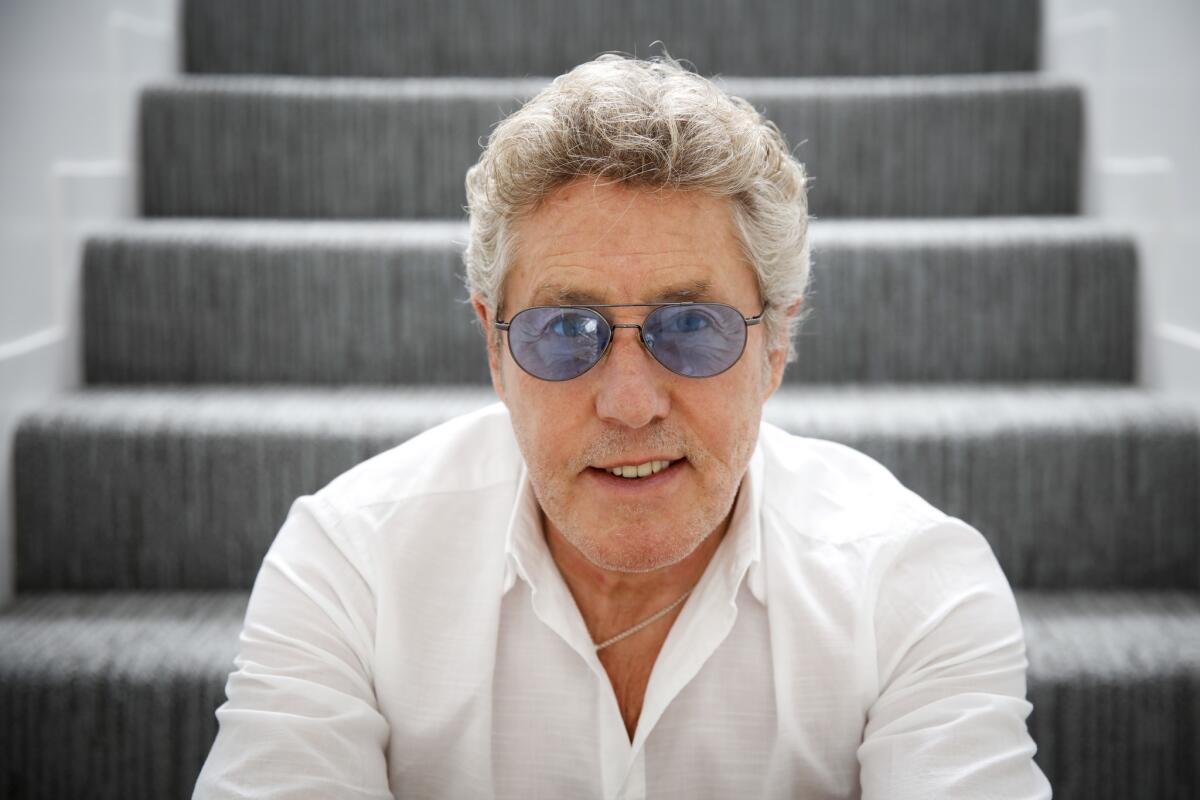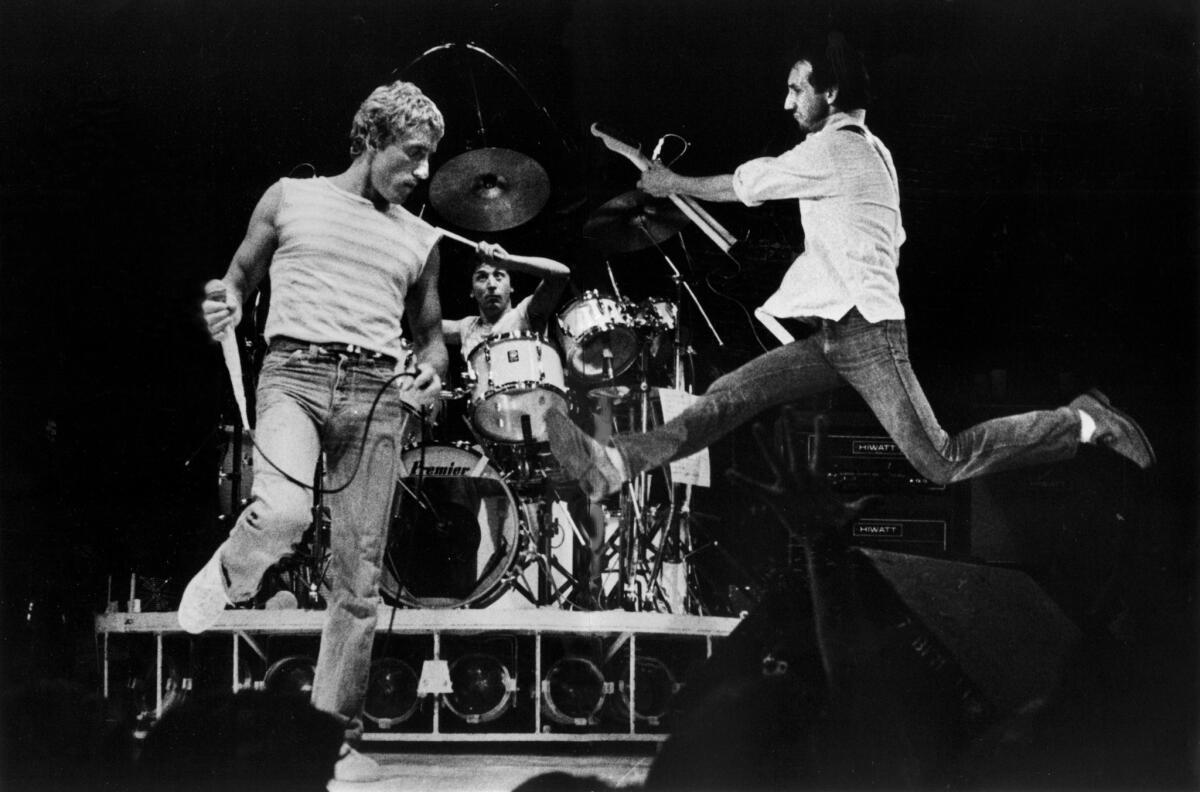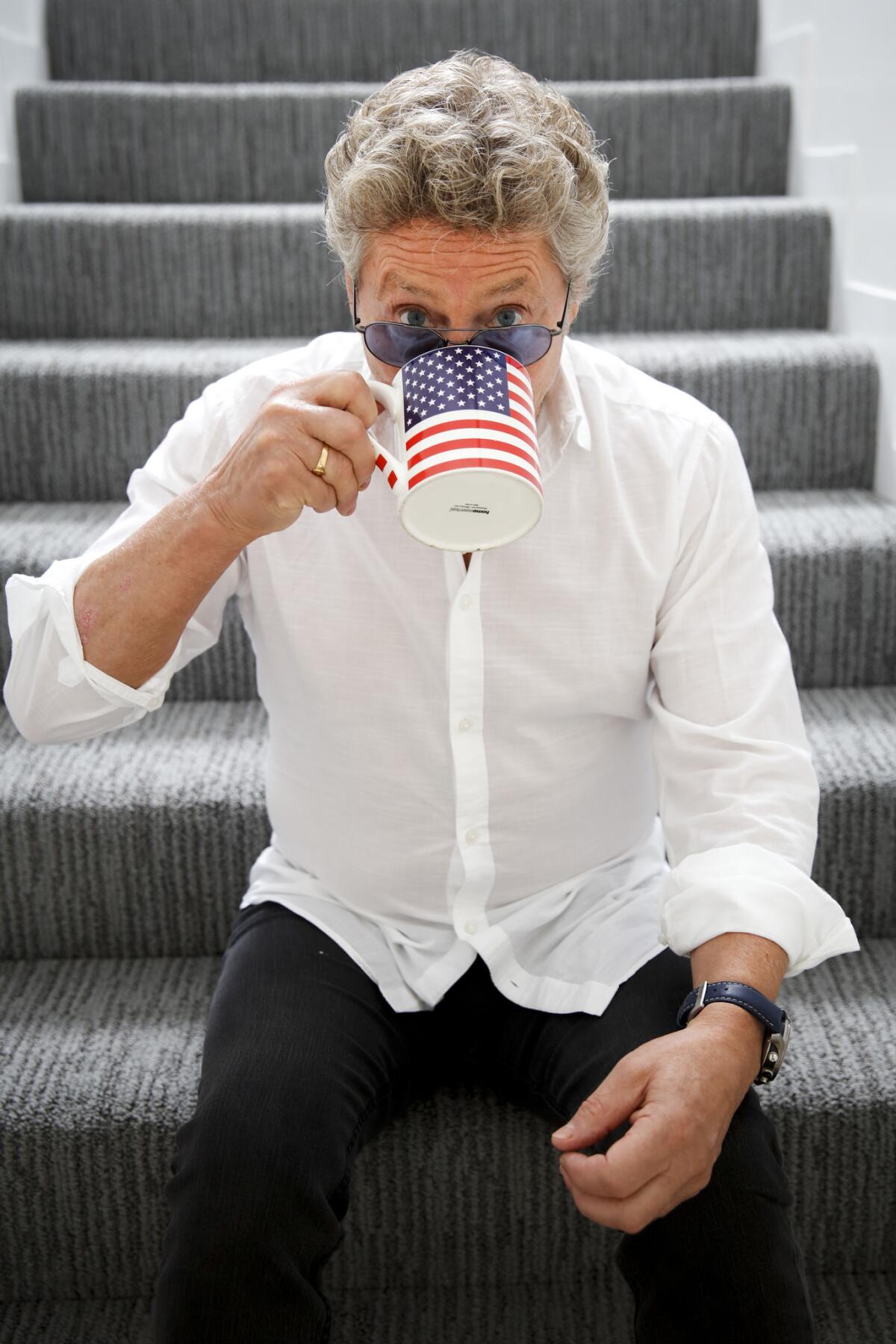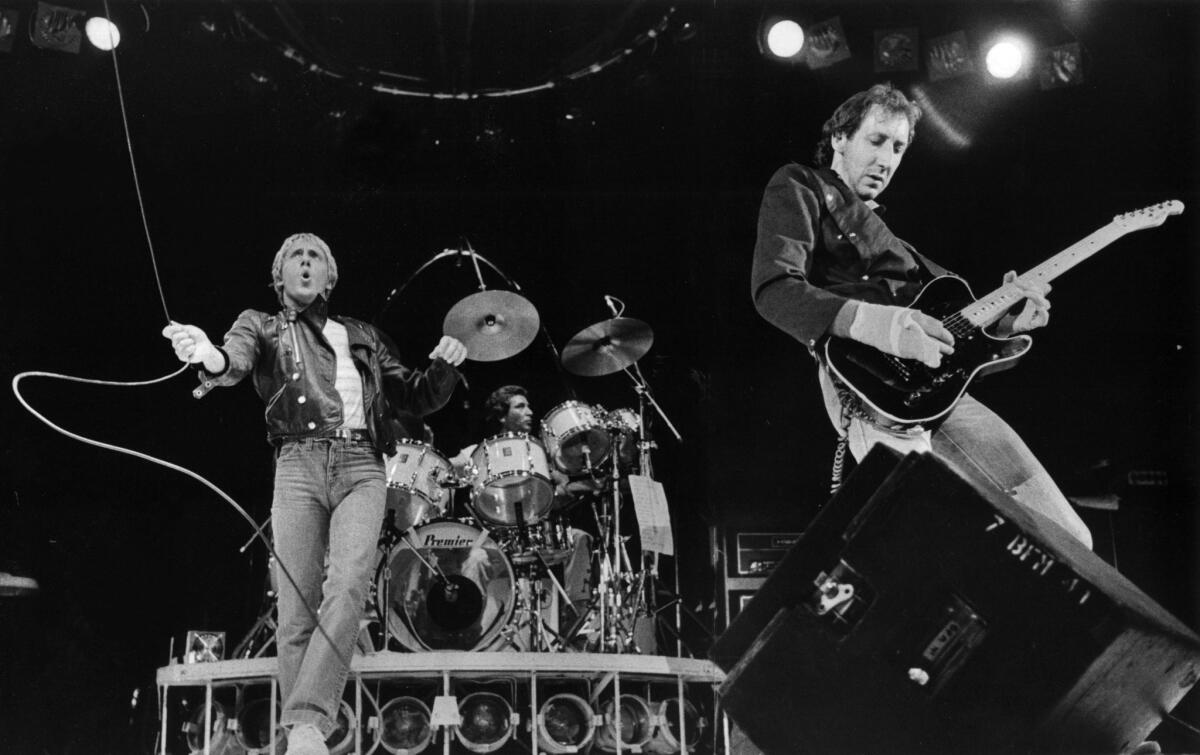Q&A: Roger Daltrey on swagger and sensitivity, the new Who tour, plus the Beatles question

- Share via
In 2015, Roger Daltrey nearly died from viral meningitis. When he recovered, the lead singer of The Who went back on the road, but he also decided it was time to “get this bloody thing finished” — the thing being his memoir, “Thanks a Lot Mr Kibblewhite,” published in October.
The memoir was praised in reviews as “one of the best rock memoirs in recent memory,” for being “witty” and even for having “meaning,” above and beyond the usual tell-all. Meanwhile, Daltrey has done what he always does. He’s gotten back to work — in the studio with Pete Townshend to record the first new Who album in 13 years and on the stage at age 74 for a new Who tour set to begin in May.
The book perfectly captures Daltrey’s voice — his humor, his defiance and his blunt assessment of himself and others — but it also shows a forgiving side to the feisty icon, even to people who wronged him, including former managers Chris Stamp and Kit Lambert.
Daltrey captures what the rock life meant for him and why he stayed off drugs and pushed his bandmates in The Who — one of the greatest but also most dysfunctional of all rock bands — to clean up and work harder. (He was sometimes violent and not always successful in this approach.)
There are plenty of great behind-the-scenes stories, but this is not an “And in this recording session ...” memoir. “It’s not just a series of events,” Daltrey says. “It’s what I went through emotionally, while these events were happening, and what I tried to do as an artist and a singer.”
In other words, on the cusp of taking the stage once more with his musical sparring partner, Daltrey’s memoir strives to answer Pete Townshend’s most famous question: Who are you?
Pete Townshend’s memoir, “Who I Am,” is well over 500 pages, while yours clocks in at less than 250. Was that contrast conscious or is this direct and to-the-point approach a reflection of who you are?
The book reflects who I am. It’s about me and my personality. It’s not a book about The Who; it’s my journey. Some of it is about how I dealt with the problems that were thrown up by the band. Who fans are disappointed because I don’t talk about music enough, but talking about music that much is ... dull as dishwater.
I didn’t want to do the sex, drugs and rock ’n’ roll book, because once you’ve been to one party and done a load of drugs — which I didn’t do anyway — well, those books can be kind of empty in a way. And how much sex can you talk about? It’s just dull. I didn’t … anybody famous.

RELATED: The Who announce Moving On! tour, new album in the works
Your persona was often one of bulletproof swagger — and we do see you punch out Keith Moon and Pete Townshend on different occasions. Still, you come across as more sensitive and vulnerable. Did you want your fans to see you in a different light?
I’m just being honest. And I am sensitive. That’s why I’m a great singer. To be a great singer you have to have empathy with the words you’re singing, and you can’t do that unless you’re incredibly sensitive. Although I’m also someone who fights back ... which is why there were a few years there early on where I could have gone completely the wrong way.
Pete is often described as rock’s intellectual, but you’re also a bit of a polymath. The book touches on this — at one point you quote a paper on “Effects of Group Singing and Performance for Marginalised and Middle-Class Singers” — but you have a lot of interests that barely get touched on. Why didn’t you get into those sides of you more?
I have done so many things in my life. In between tours I wasn’t a sitting-down person. So I built lakes from nothing, with a couple of bulldozers that were always breaking down. We spent so much time thrashing about in mud. We had four fish farms. I became a trout farmer, and then I got interested in the science of it and in cleaning up the rivers. There’s been so much bad practice going on in the rivers of England. I did that for 20 years. I really learned about it, and we got salmon back in the Thames. There are all kinds of things like that which I’m very proud of. But it can be very dull talking about fish. No one gives a … about the fish.
Were there any great stories you cut?
There are so many anecdotes, but most of them are out there. You can go on forever giving Keith Moon stories. I didn’t want to do that.
Your relationship with Keith was often fraught. In the book, looking back, you see his tales of destruction as less humorous and more tragic, including the time he accidentally ran over and killed his bodyguard when he was trying to flee a crowd. Are Who fans open to rethinking the myths they cherish?
Fans want to hear what they want to hear, and I don’t really give a … . This is my perspective. Keith was, in a lot of ways, incredibly tragic. After we had the fight in Denmark [over Moon’s drugged-out performance onstage] we were very distant for two or three years. But toward the end I was one of the closest ones to him. Heather, my wife, and I were the last ones picking up the phone at 4 in the morning to a crying Keith Moon on the other end.
You recount some difficult times with John Entwistle. While you call him a “genius,” you also say his rampant ego meant he played too loud for you and Pete. Was he harder to get close to?
Yes. We called John “The Ox,” and it was an apt name because he was so stubborn. You couldn’t have changed one bit about John Entwistle. He was going to be a rock star and live like a rock star even if he didn’t have the money. Hence we were always bailing him out.
Do you take satisfaction from the fact that after years of friction you and Pete have gotten closer as you’ve gotten older?
It’s a strange relationship. We’re not close like buddies that go out. It’s kind of like a family thing, like brothers. Although I’ve never had a brother. But maybe it’s not like that. It’s something really special. Maybe there’s not a word for what our relationship is.
Has Pete read the book?
I don’t know. I haven’t read his book. [He laughs heartily.]
Really, I deliberately don’t read anything written about me, and I didn’t want to read anything he might have written that would get in my head.

I didn’t want to do the sex, drugs and rock ‘n’ roll book. ... Those books can be kind of empty. ... And how much sex can you talk about?
— Roger Daltrey
What’s next?
My biggest plan is to get a Keith Moon film started. It’s very difficult because I don’t want to make a biopic. I want to make a great film. They all seem to fall into the same trap, except for the Brian Wilson one, “Love and Mercy,” which was great. We’ll be working on a new script. I’ll get there; I’ve got the vision of what I want it to be.
I’m also going to release a live album of my “Tommy” show that I just did with an orchestra, for the 50th anniversary of “Tommy.” This is the way “Tommy” should have always been played — with orchestrations and with the band.
One mistake rock bands make is when they just have orchestras playing “pads,” as I call them, music that could be played on a synthesizer. This “Tommy” has properly arranged orchestral, percussive pieces that stand up on their own. There’s nothing schmaltzy in there.
Another mistake people make is taking the rock out. When Pete did “Quadrophenia” with an orchestra but without the rock band, well, taking the rock out of “Quadrophenia” was, to me, an anathema. It didn’t make sense.
But you put the two together, it becomes huge. I was really bowled over by it. It’s triumphant.
Since we last spoke, you’ve confirmed a new album and tour with the Who. How will this tour be different? You’ve mentioned that Pete was less interested in deep cuts like “A Quick One” that diehard fans love seeing live.
He’s coming around to it now because we’ve done all the other stuff. In my solo shows I’ve done “How Many Friends,” “Dreaming from the Waist,” “Athena,” and other songs the Who never really played. Pete won’t do “Blue, Red and Grey,” but I love it and I’ll do it. We’re talking now and coming up with ideas.
The Who still has its vocalist and guitar player. There’s another old band that still has a bassist and a drummer. Would you ever take a foursome out on the road with Paul McCartney and Ringo Starr, doing songs like “Can’t Explain” and “I Saw Her Standing There”?
[Laughs] I’m going to see Paul soon, but I don’t think that would work. I don’t think you could mix our music and the Beatles’ music.

ALSO
From the Archives: The Who: 50 and still fabulous in Anaheim in 2016
From the Archives: When the Who returned to Los Angeles in 1980
Five things we learned from the Who Hits 50! tour in Anaheim
The Who’s 2017 residency at Caesars in Vegas starts with six concerts
More to Read
The biggest entertainment stories
Get our big stories about Hollywood, film, television, music, arts, culture and more right in your inbox as soon as they publish.
You may occasionally receive promotional content from the Los Angeles Times.










